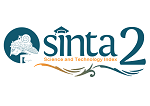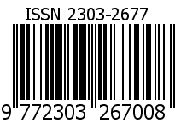Systematic review of archivists’ evolving ethics in the age of artificial intelligence
Abstract
The development of artificial intelligence (AI) in the field of archiving raises new ethical challenges, such as algorithmic bias, loss of human context, and unclear accountability. Therefore, a systematic literature review is needed to understand how the ethics and professional values of archivists evolve in the face of AI-based digital transformation. This study aimed to determine how the ethics and professional values of archivists evolved in the era of artificial intelligence through an analysis of thematic patterns, ethical issues, and strategic responses that arose from human and AI interactions in archival practice. This study used the systematic literature review (SLR) method with reference to the PRISMA protocol. A total of 50 indexed and peer-reviewed journal articles published between 2018 and 2025 were analyzed, obtained from academic databases such as Scopus, SpringerLink, and Taylor & Francis. The analysis revealed five key domains: shifting roles and identities of archivists, reconfiguration of ethical principles in digital practice, dynamics of human–AI collaboration, reconstruction of professional values in an AI-based ecosystem, and strategic implications for strengthening the profession. The study concludes that archivists not only need to adapt to AI but also play an active role in guiding its implementation through ethical design, enhancing digital and ethical literacy, and updating professional codes of conduct. These efforts are essential to maintaining public trust, ensuring professional accountability, and ensuring the sustainability of the archivist’s role in an increasingly automated digital society.
Keywords
Full Text:
PDFReferences
Atah, C. A., & Akeke, N. G. M. (2024). Availability and Accessibility of Digital Record Keeping among University Administrators in Nigeria. Journal of International Cooperation and Development, 7(1), 42. https://doi.org/10.36941/jicd-2024-0004
Baird, A., & Schuller, B. (2020). Considerations for a More Ethical Approach to Data in AI: On Data Representation and Infrastructure. In Frontiers in Big Data (Vol. 3). Frontiers Media S.A. https://doi.org/10.3389/fdata.2020.00025.
Bernard, N., & Balog, K. (2025). A Systematic Review of Fairness, Accountability, Transparency, and Ethics in Information Retrieval. ACM Computing Surveys, 57(6), 1–29.
Besio, C., Fedtke, C., Grothe-Hammer, M., Karafillidis, A., & Pronzini, A. (2024). Algorithmic responsibility without accountability: Understanding data-intensive algorithms and decisions in organizations. Systems Research and Behavioral Science. https://doi.org/10.1002/sres.3028.
Biagini, G. (2025). Towards an AI-Literate Future: A Systematic Literature Review Exploring Education, Ethics, and Applications. In International Journal of Artificial Intelligence in Education. Springer. https://doi.org/10.1007/s40593-025-00466-w.
Bowers, J., Cushman, J., Sarathy, J., & Zittrain, J. (2024). Time Capsule’Archiving through Strong Dark Archives (SDA): Designing Trustable Distributed Archives for Sensitive Materials. Journal of Archival Organization, 18(3–4), 147–176.
Bradley, F. (2022). Representation of Libraries in Artificial Intelligence Regulations and Implications for Ethics and Practice. Journal of the Australian Library and Information Association, 71(3), 189–200. https://doi.org/10.1080/24750158.2022.2101911.
Cameron, S., Franks, P., & Hamidzadeh, B. (2023). Positioning Paradata: A Conceptual Frame for AI Processual Documentation in Archives and Recordkeeping Contexts. Journal on Computing and Cultural Heritage, 16(4). https://doi.org/10.1145/3594728.
Cook, T. (2011). “We are what we keep; we keep what we are”. Journal of the Society of Archivists, 32(2), 173–189.
Cushing, A. L., & Osti, G. (2022). "So, how do we balance all of these needs?": how the concept of AI technology impacts digital archival expertise. Journal of Documentation, 79(7), 12–29. https://doi.org/10.1108/JD-08-2022-0170.
Fasting, R. B., & Breilid, N. (2024). Cross-professional collaboration to improve inclusive education. Scandinavian Journal of Educational Research, 68(4), 661–676. https://doi.org/10.1080/00313831.2023.2175248.
Faulconbridge, J., Folke Henriksen, L., & Seabrooke, L. (2021). How professional actions connect and protect. Journal of Professions and Organization, 8(2), 214–227. www.nextgenpsf.co.uk.
Green, P. (2025). AI and the visualization needs of researchers using email archives. AI and Society. https://doi.org/10.1007/s00146-025-02187-z.
Harris, V. (2002). The archival sliver: Power, memory, and archives in South Africa. Archival Science, 2, 63–86.
Hernandez, R. A., & Rockembach, M. (2025). Building trustworthy AI solutions: integrating artificial intelligence literacy into records management and archival systems. AI and Society. https://doi.org/10.1007/s00146-025-02194-0.
Jaillant, L. (2019). After the digital revolution: working with emails and born-digital records in literary and publishers’ archives. Archives and Manuscripts, 47(3), 285–304. https://doi.org/10.1080/01576895.2019.1640555.
Jaillant, L. (2022). How can we make born-digital and digitized archives more accessible? Identifying obstacles and solutions. Archival Science, 22(3), 417–436. https://doi.org/10.1007/s10502-022-09390-7.
Jaillant, L., & Caputo, A. (2022). Unlocking digital archives: cross-disciplinary perspectives on AI and born-digital data. AI and Society, 37(3), 823–835. https://doi.org/10.1007/s00146-021-01367-x.
Jaillant, L., & Rees, A. (2023). Applying AI to digital archives: trust, collaboration and shared professional ethics. Digital Scholarship in the Humanities, 38(2), 571–585. https://doi.org/10.1093/llc/fqac073.
Järvelä, S., Nguyen, A., & Hadwin, A. (2023). Human and artificial intelligence collaboration for socially shared regulation in learning. British Journal of Educational Technology, 54(5), 1057–1076. https://doi.org/10.1111/bjet.13325.
Knight, S., McGrath, C., Viberg, O., & Pargman, T. C. (2025). Learning about AI ethics from cases: a scoping review of AI incident repositories and cases. AI and Ethics, 5(3), 2037–2053. https://doi.org/10.1007/s43681-024-00639-8.
Lemieux, V. L., & Marciano, R. (2025). Teaching computational archival science: context, pedagogy, and future directions. Information Research, 30(iConf 2025), 301–318. ttps://doi.org/10.47989/ir30iConf47347.
Maghfiroh, A., Styati, E. W., Fachriza, A., Khoiriyah, K., Simpol, W., Syaputra, R. A., & Lathifah, L. (2023). Future-Ready Educators: Assessing Digital Competence and Teaching Preparedness Among Prospective Teachers in the 21st Century. Indonesian Journal on Learning and Advanced Education (IJOLAE), 6(1), 47–61. https://doi.org/10.23917/ijolae.v6i1.23081
Mannheimer, S., Clark, J. A., Young, S. W. H., Sheehey, B., Bond, N., Rossmann, D., Scates Kettler, H., & Shorish, Y. (2024). An Ethical Reflection Aid for Responsible AI in Computational Archival Science. Information Technology and Libraries, 43, 1. https://orcid.org/0000-0001-7706-713X.
Ma, Y., Dai, B., & Ding, B. (2022). University Archives Autonomous Management Control System under the Internet of Things and Deep Learning Professional Certification. Computational Intelligence and Neuroscience, 2022, 1. https://doi.org/10.1155/2022/4854213.
M’kulama, A., & Bwalya, T. (2024). Digital curation of records at the National Archives of Zambia. ESARBICA Journal: Journal of the Eastern and Southern Africa Regional Branch of the International Council on Archives, 43, 176–192.
Mordell, D. (2019). Critical questions for archives as (big) data. Archivaria, 87(87), 140–161.
Morley, J., Floridi, L., Kinsey, L., & Elhalal, A. (2020). From What to How: An Initial Review of Publicly Available AI Ethics Tools, Methods and Research to Translate Principles into Practices. Science and Engineering Ethics, 26(4), 2141–2168. https://doi.org/10.1007/s11948-019-00165-5.
Novo, A., & Ochôa, P. (2023). Challenges to Information Literacy Online Learning in Higher Education: Libraries, Archives, and Museums Digital Strategic Convergence. European Conference on Information Literacy, 227–238.
Ostanina, A., Bazyl, O., Tsviakh, O., & Dovzhuk, N. (2023). Formation of digital competence in higher education students as a basis for the transformation of education of the future. Futurity Education, 126–135. https://doi.org/10.57125/fed.2023.25.03.10.
Owens, T., & Padilla, T. (2021). Digital sources and digital archives: historical evidence in the digital age. International Journal of Digital Humanities, 1(3), 325–341. https://doi.org/10.1007/s42803-020-00028-7.
Pacheco, A., Da Silva, C. G., & De Freitas, M. C. V. (2023). A metadata model for authenticity in digital archival descriptions. Archival Science, 23(4), 629–673. https://doi.org/10.1007/s10502-023-09422-w.
Page, M. J., McKenzie, J. E., Bossuyt, P. M., Boutron, I., Hoffmann, T. C., Mulrow, C. D., Shamseer, L., Tetzlaff, J. M., & Moher, D. (2021). Updating guidance for reporting systematic reviews: development of the PRISMA 2020 statement. Journal of Clinical Epidemiology, 134, 103–112. https://doi.org/10.1016/j.jclinepi.2021.02.003.
Pansoni, S., Tiribelli, S., Paolanti, M., Di Stefano, F., Frontoni, E., Malinverni, E. S., & Giovanola, B. (2023). Artificial intelligence and cultural heritage: Design and assessment of an ethical framework. International Archives of the Photogrammetry, Remote Sensing and Spatial Information Sciences, 48, 149–1155.
Rolan, G., Humphries, G., Jeffrey, L., Samaras, E., Antsoupova, T., & Stuart, K. (2019). More human than human? Artificial intelligence in the archive. Archives and Manuscripts, 47(2), 179–203.
Ryan, M. (2020). In AI We Trust: Ethics, Artificial Intelligence, and Reliability. Science and Engineering Ethics, 26(5), 2749–2767. https://doi.org/10.1007/s11948-020-00228-y.
Schneider, J., Adams, C., DeBauche, S., Echols, R., McKean, C., Moran, J., & Waugh, D. (2019). Appraising, processing, and providing access to email in contemporary literary archives. Archives and Manuscripts, 47(3), 305–326. https://doi.org/10.1080/01576895.2019.1622138.
Soudi, M. S., & Bauters, M. (2024). AI Guidelines and Ethical Readiness Inside SMEs: A Review and Recommendations. Digital Society, 3(1). https://doi.org/10.1007/s44206-024-00087-1.
Stahl, B. C. (2022). From computer ethics and the ethics of AI towards an ethics of digital ecosystems. AI and Ethics, 2(1), 65–77. https://doi.org/10.1007/s43681-021-00080-1.
Subotić, J. (2021). Ethics of archival research on political violence. Journal of Peace Research, 58(3), 342–354. https://doi.org/10.1177/0022343319898735.
Teel, Z. (2024). Artificial Intelligence’s Role in Digitally Preserving Historic Archives. Preservation, Digital Technology and Culture, 53(1), 29–33. https://doi.org/10.1515/pdtc-2023-0050.
Tella, A., Amuda, H. O., & Ajani, Y. A. (2022). Relevance of blockchain technology and the management of libraries and archives in the 4IR. Digital Library Perspectives, 38(4), 460–475. https://doi.org/10.1108/DLP-08-2021-0065.
Tesar, M. (2018). Ethics and truth in archival research. History of Education, 44(1), 101–114.
Thylstrup, N. B. (2022). The ethics and politics of data sets in the age of machine learning: deleting traces and encountering remains. Media, Culture and Society, 44(4), 655–671. https://doi.org/10.1177/01634437211060226.
Tiribelli, S., Pansoni, S., Frontoni, E., & Giovanola, B. (2024). Ethics of Artificial Intelligence for Cultural Heritage: Opportunities and Challenges. IEEE Transactions on Technology and Society, 5(3), 293–305. ttps://doi.org/10.1109/TTS.2024.3432407.
Tukur, M., Schneider, J., Househ, M., Dokoro, A. H., Ismail, U. I., Dawaki, M., & Agus, M. (2023). The metaverse digital environments: a scoping review of the challenges, privacy and security issues. Frontiers in Big Data, 6, 1. https://doi.org/10.3389/fdata.2023.1301812.
Tzouganatou, A. (2022). Openness and privacy in born-digital archives: reflecting the role of AI development. AI and Society, 37(3), 991–999. https://doi.org/10.1007/s00146-021-01361-3.
van Otterlo, M. (2018). Gatekeeping algorithms with human ethical bias: The ethics of algorithms in archives, libraries and society. ArXiv Preprint ArXiv, 1801.01705.
Vössing, M., Kühl, N., Lind, M., & Satzger, G. (2022). Designing Transparency for Effective Human-AI Collaboration. Information Systems Frontiers, 24(3), 877–895. https://doi.org/10.1007/s10796-022-10284-3.
Willem, T., Fritzsche, M. C., Zimmermann, B. M., Sierawska, A., Breuer, S., Braun, M., Ruess, A. K., Bak, M., Schönweitz, F. B., Meier, L. J., Fiske, A., Tigard, D., Müller, R., McLennan, S., & Buyx, A. (2025). Embedded Ethics in Practice: A Toolbox for Integrating the Analysis of Ethical and Social Issues into Healthcare AI Research. Science and Engineering Ethics, 31(1). https://doi.org/10.1007/s11948-024-00523-y.
Yadav, A. K. S. (2022). The essential skills and competencies of LIS professionals in the digital age: alumni perspectives survey. Global Knowledge, Memory and Communication, 71(8–9), 837–856. https://doi.org/10.1108/GKMC-03-2021-0049.
Yan, L., Sha, L., Zhao, L., Li, Y., Martinez-Maldonado, R., Chen, G., Li, X., Jin, Y., & Gašević, D. (2024). Practical and ethical challenges of large language models in education: A systematic scoping review. British Journal of Educational Technology, 55(1), 90–112. https://doi.org/10.1111/bjet.13370.
.
DOI: https://doi.org/10.24198/jkip.v13i1.62811
Refbacks
- There are currently no refbacks.
Copyright (c) 2025 Author(s)

This work is licensed under a Creative Commons Attribution-ShareAlike 4.0 International License.
Jurnal Kajian Informasi & Perpustakaan Indexed by:
Jurnal Kajian Informasi & Perpustakaan
Program Studi Perpustakaan dan Sains Informasi d.h. Program Studi Ilmu Perpustakaan
Fakultas Ilmu Komunikasi, Universitas Padjadjaran
Jl. Raya Bandung-Sumedang Km. 21 Jatinangor, Sumedang, Indonesia 45363
WA: +62 877-1860-4022 (Risa Nurisani)
Telepon: +62227796954
Faksimile: +62227794122
email: jkip.fikom@unpad.ac.id
Jurnal Kajian Informasi & Perpustakaan is licensed under a Creative Commons Attribution-ShareAlike 4.0 International License
Jurnal Kajian Informasi & Perpustakaan supervised by:












2.png)
.png)



